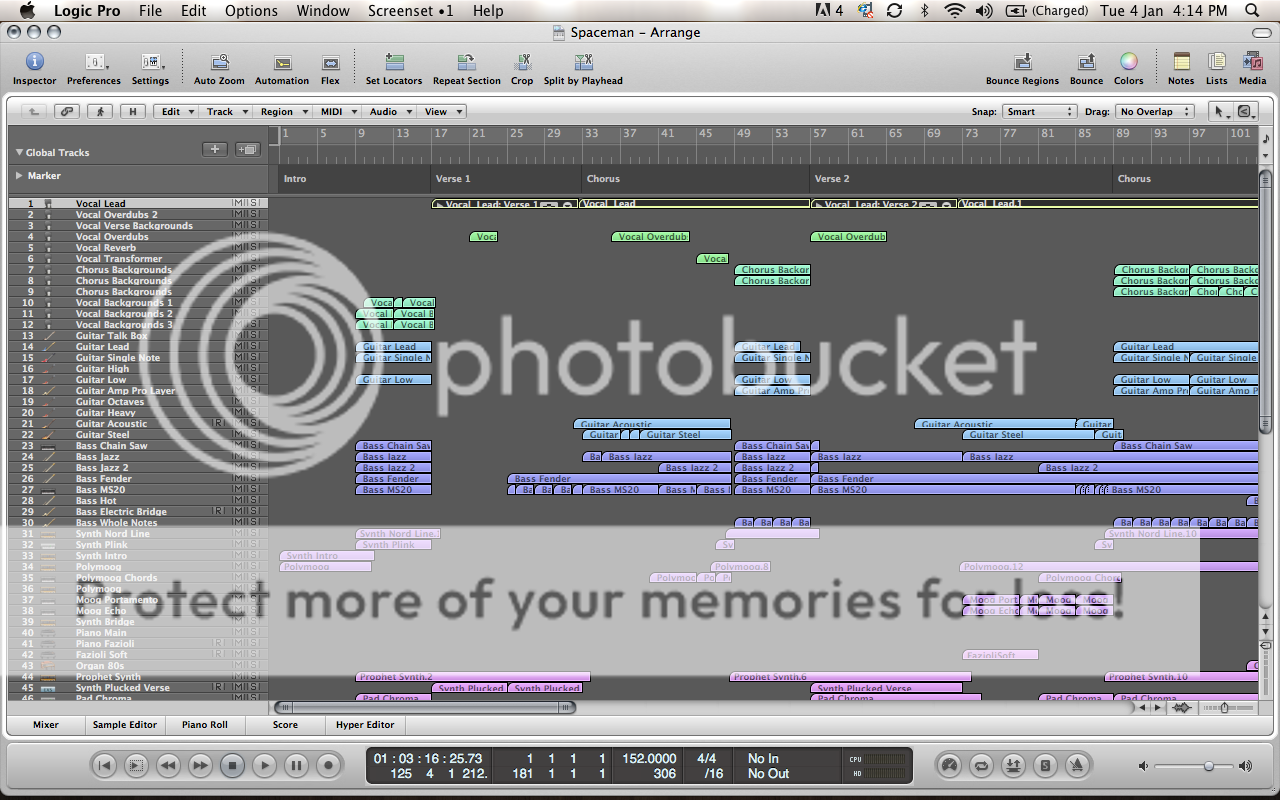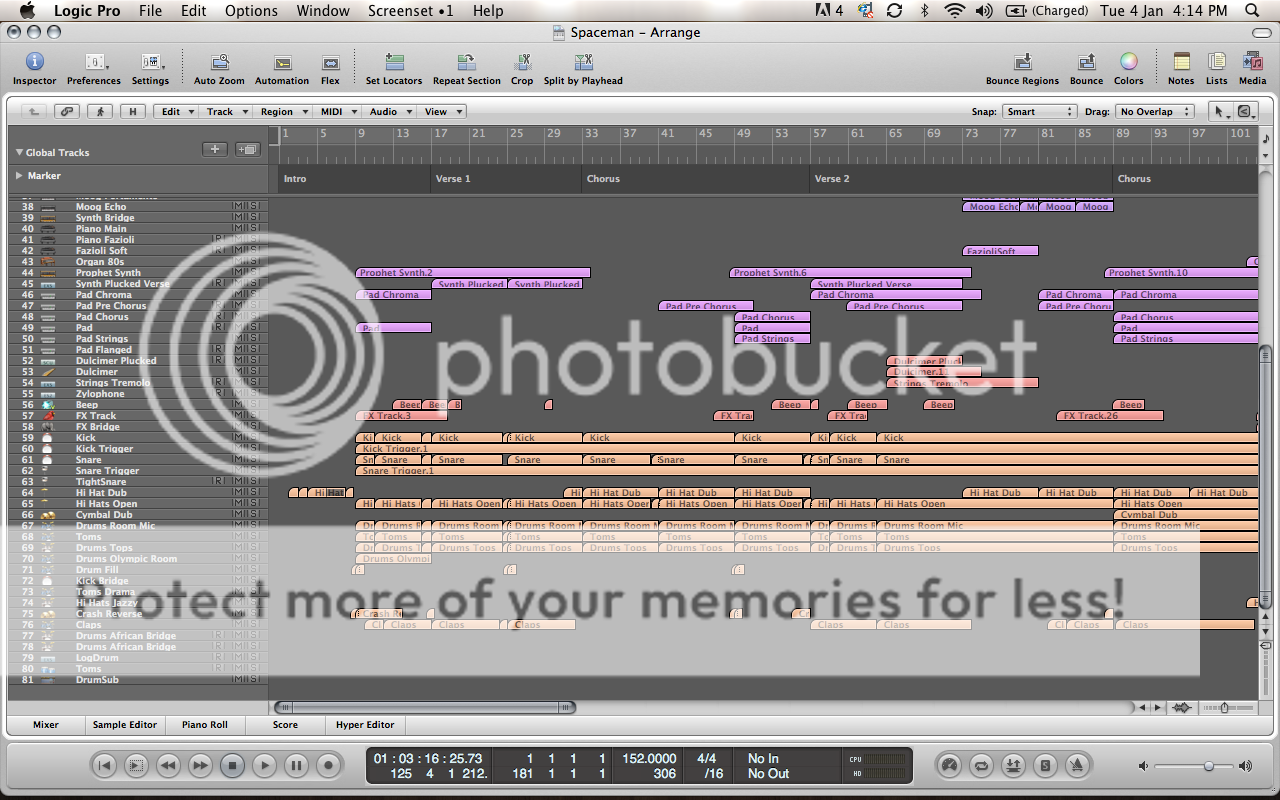M
Mike Freze
New member
Hi, Everyone! Hope I get some neat responses to this one.
If one is producing a demo of one's own songs for distribution to music people in hopes of getting a record deal (or for the purpose of getting gigs, for that matter), it seems to me there are two things to think about: find a "niche" for the type of music you want to produce (rock, country, hip hop, rap. classical, blues, jazz, opera, metal. pop, etc.) and then the "style" of how you produce demos or final albums: bold, in-your-face- type of productions or just basic, bare types of productions. Both seem to work.
Examples of bold, massive, huge productions with lots of orchestra add-ons, up and down ebb and flows throughout the songs, changing tempos, nice chord progressions, super background harmony vocals, etc. Some great artists that come to mind who are successfull with this approach are: Celne Dion ("Titanic,") The Bee Gees (everything they do), Neil Diamond, Frank Sinatra, U2 (yes, they are bold with a full sound), Barry Manilow (always builds songs, adds lots of orchestration, etc.).
Then there are the equally great artists that are produced with a more basic, no-thrills kind of production: just the basic 4-5 piece band with only a few extras added to their recordings: The Rolling Stones, James Blunt ("You're Beautiful"), James Taylor, Hank Willimas Jr., ZZ Top, Metallica, and so on.
In other words, the above write great songs, have great recordings, and very few extra musicians or singers are need for their live performances (or recordings) to sound great: they stand alone.
Compare two equally great hits: "You're Beautiful" (James Blunt) and "Titanic" (Celene Dion) and you can tell the first is a basic production, the other is lavish with lost of things added to the arrangement. Both very successful.
So how do you determine if you should go lavish, full production (like Burt Bacharach's songs for Dion Warwick) vs. basic productions for people like Aerosmith who stand alone as artists with just their band and very few extra frills?
I realize most of this boils down to slow, ballad-type songs (pop, country, rock, or folk). But even with upbeat artists like U2 or Duran Duran, they go for really big sounds.
Any advice? If you're making a demo for yourself or for others (original songs), which is the best way to present a GREAT song, a crossover song?? Will you get in the way of well-known record producers if you over produce or is best to "shine" to "outshine" your competition? In terms of slow, ballad (love song) type songs, I am inclined to go with the bold approach like Barry Manilow or what Reba MyIntyre or what Faith Hill does with their recordings. Yet the simpler productions work too.
Mike Freze
If one is producing a demo of one's own songs for distribution to music people in hopes of getting a record deal (or for the purpose of getting gigs, for that matter), it seems to me there are two things to think about: find a "niche" for the type of music you want to produce (rock, country, hip hop, rap. classical, blues, jazz, opera, metal. pop, etc.) and then the "style" of how you produce demos or final albums: bold, in-your-face- type of productions or just basic, bare types of productions. Both seem to work.
Examples of bold, massive, huge productions with lots of orchestra add-ons, up and down ebb and flows throughout the songs, changing tempos, nice chord progressions, super background harmony vocals, etc. Some great artists that come to mind who are successfull with this approach are: Celne Dion ("Titanic,") The Bee Gees (everything they do), Neil Diamond, Frank Sinatra, U2 (yes, they are bold with a full sound), Barry Manilow (always builds songs, adds lots of orchestration, etc.).
Then there are the equally great artists that are produced with a more basic, no-thrills kind of production: just the basic 4-5 piece band with only a few extras added to their recordings: The Rolling Stones, James Blunt ("You're Beautiful"), James Taylor, Hank Willimas Jr., ZZ Top, Metallica, and so on.
In other words, the above write great songs, have great recordings, and very few extra musicians or singers are need for their live performances (or recordings) to sound great: they stand alone.
Compare two equally great hits: "You're Beautiful" (James Blunt) and "Titanic" (Celene Dion) and you can tell the first is a basic production, the other is lavish with lost of things added to the arrangement. Both very successful.
So how do you determine if you should go lavish, full production (like Burt Bacharach's songs for Dion Warwick) vs. basic productions for people like Aerosmith who stand alone as artists with just their band and very few extra frills?
I realize most of this boils down to slow, ballad-type songs (pop, country, rock, or folk). But even with upbeat artists like U2 or Duran Duran, they go for really big sounds.
Any advice? If you're making a demo for yourself or for others (original songs), which is the best way to present a GREAT song, a crossover song?? Will you get in the way of well-known record producers if you over produce or is best to "shine" to "outshine" your competition? In terms of slow, ballad (love song) type songs, I am inclined to go with the bold approach like Barry Manilow or what Reba MyIntyre or what Faith Hill does with their recordings. Yet the simpler productions work too.
Mike Freze


